
Tell me darling - am I going too far?: The protean powers of Betty Marsden
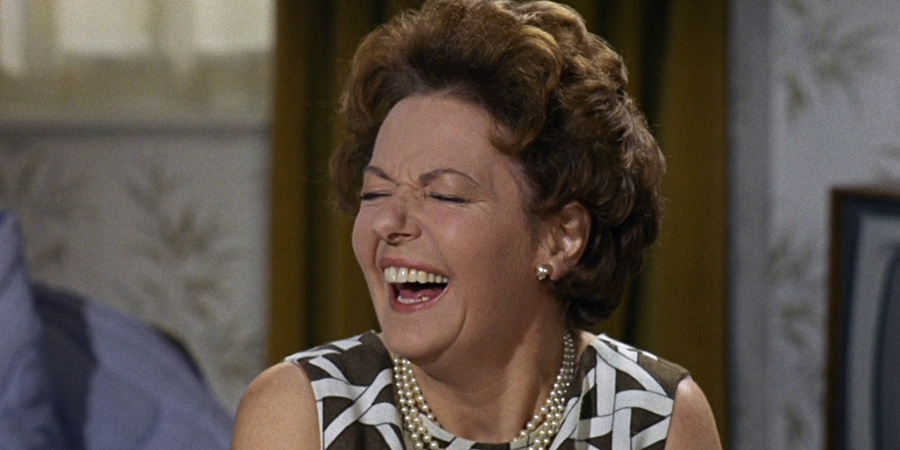
There have been many funny women on the radio, and quite a few of them have been Betty Marsden. As a star of numerous revues and sketch shows, she played just about every conceivable kind of female character, and made each one of them sound distinctive, amusing and, in their own peculiar way, believable. Her sheer range, and comic craft, were truly remarkable.
Some might best remember her from the Carry On movies, such as her appearance in Carry On Camping as Harriet Potter, the indomitably jolly, chronically-cackling wife of the grudgingly obedient Peter (Terry Scott), while others may recall her better from the peak of her radio days playing multiple characters in Beyond Our Ken and Round The Horne.
Born in 1919 in West Derby, Liverpool, but brought up from the age of two first in Aylesbury, Buckinghamshire, and then Shepton Mallet in Somerset, her early years were difficult, and her prospects distinctly poor. 'We were absolutely broke,' she later said. 'My father went from job to job and lost every one of them, and so we were living on a very, very, grim line of poverty.'
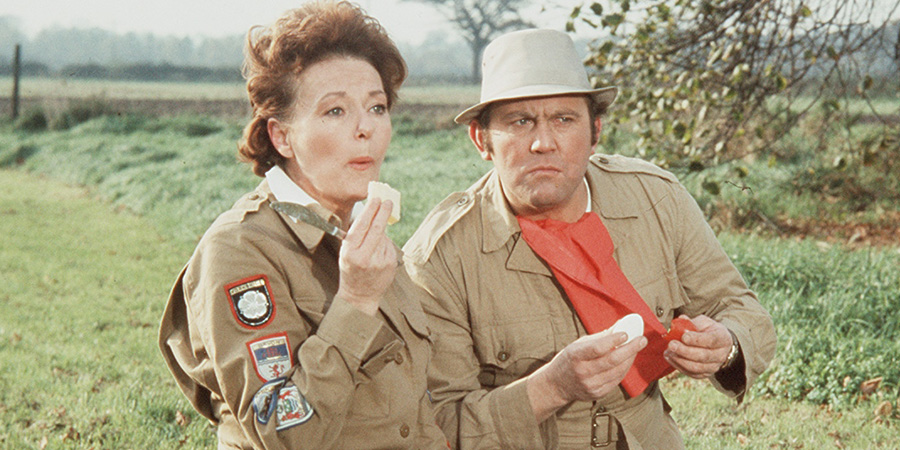
She would insist, however, that, as a child, she was largely oblivious to the seriousness of the circumstances. 'It was the adults who went without,' she said, 'the children got the bread and jam.'
She was the youngest member of the family - there were three brothers and one sister - and, it seems, by far the most outgoing. 'I was always acting,' she would recall. 'I was always sticking my dress in my bloomers.'
Her escape from a life of drudgery came, as if in a fairy tale, through a hole in the hedge at the bottom of the garden:
There was a private house, and I was fascinated by the people who lived there. They were so glamorous - I think I thought they were. There was a woman, an older woman, who used to walk round the garden with a shawl around her head and I used to watch her, because she used to go to these stone urns full of flowers and sort of pick off dead heads and put them in a little basket. And I used to stare at her through the hedge. One day she said to me: 'Why have you made a hole in my hedge, little girl?' And I said: 'I like looking at you'. She said: 'Oh, well, come in'. And she became a very great friend. A very great friend. Eventually I called her 'Grandmother'. And her daughter, who was a rather famous music teacher at that time, stood in her drawing room and said: 'Make me laugh'. You try that when you're nine years old! But I did, and I succeeded. She became extremely interested in me, and it was through her that we found people who sponsored me.
Marsden would never name this mother and daughter publicly (although, judging from contemporary references and known associations, the most likely candidates appear to have been a Mrs John Allen, an elderly widow, and her daughter Betty Allen, a well-regarded local music teacher), but she would come to regard them as her unofficial guardians. It was thanks to them that, after arranging for Betty to undergo elocution lessons and then entering her in a number of local talent competitions (where her 'clever and pretty dancing' and 'beautiful recitations' won plenty of praise in the Shepton Mallet Journal), she secured an audition at the Italia Conti Academy of Theatre Arts in London. It was there, in the presence of Italia Conti's sister, Bianca Murray, that she proceeded to perform some impersonations, recite a passage from a play and sing a song.
The somewhat haughty Bianca Murray watched all of this with her fingers stretched out like a fan over her face masking all but her staring eyes, affecting an air of icy indifference. 'Do you dance?' she asked glumly. 'Oh, yes,' replied Marsden brightly, still desperate to impress. 'Bring in Charlie,' Murray barked at one of her minions.
'Charlie,' when he appeared, turned out to be a tall, very thin, dark-haired and rather pimply young man. 'To me,' Marsden would say, 'he looked about twelve: he was in shorts, had knobbly knees, and glasses.' It was Charles Hawtrey, her future Carry On co-star.
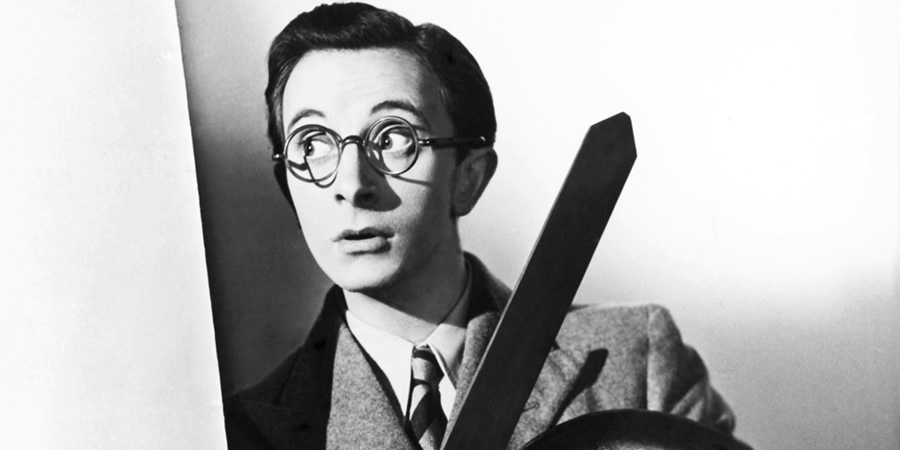
Murray ordered: 'Charlie, play something for this child to dance to'. He duly sat down at the piano and started playing, and Marsden duly danced.
Murray must have been satisfied, even though she still didn't show it, because Marsden was awarded a six-year scholarship. She had stepped through the garden hedge and out into the world of show business.
She made her London stage debut, while still at Italia Conti, at the Victoria Palace in Frederick Bowyer's popular Christmas-themed play The Windmill Man late in 1931. The achievement was reported proudly by her fellow Sheptonians via their local newspaper: 'The part of the Prince was taken, as we intimated it would be some weeks ago, by little Miss Betty Marsden, aged twelve, and her debut behind the London footlights has been for her a real triumph. All who have seen the show are unanimous in their liking of Betty's performance - a fine display of spirited acting. Well done, Betty!'
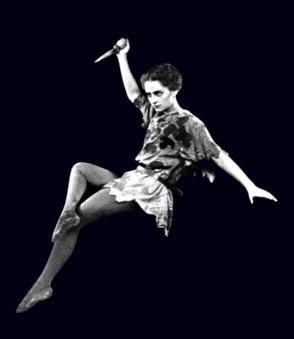
She followed this breakthrough by serving as understudy to the distinguished actor Jean Forbes-Robertson in the title role of the 1934 touring production of Peter Pan (pictured). She got her chance to appear one night in April when Forbes-Robertson fell ill, thus becoming, at the age of fifteen, the youngest Peter Pan to set foot on the British stage.
Once graduated from Italia Conti, Marsden started taking jobs, usually as an understudy, in various West End productions. They ranged from the classics through to contemporary dramas, and she made a particular impact in a Shakespearean play, although not quite in the way she had wanted.
'I played a wave in The Tempest,' she would recall. 'I was understudying several roles, but someone fell ill so I stepped in.'
At the main dress rehearsal, good fortune arrived disguised as disaster. 'I was following Neptune,' she remembered. 'I was very tall, and by this time very thin, and I got my trident caught up Neptune's skirt. I've never seen a man leave the stage so hurriedly.'
As Neptune raced away, Marsden, desperately pulling and twisting her trident in the hope of wriggling it free, raced after him, causing him to howl in pain as the pulling and twisting continued.
'I couldn't get the trident free,' she said. 'I was trying to get it free and he was fleeing the stage, because it had pierced his bum. There was no doubt about that.'
The next day, Marsden found that the incident had earned her a full-page spread in the Daily Mirror. 'I got my first bit of publicity,' she would reflect, 'for pricking Neptune's bottom.'
It was the first time that she got laughs on the stage, and it would establish a pattern as far as she was concerned, because she would always claim that the laughter came, at least during those early days as an actor, in spite, rather than because, of her own conscious efforts. 'I was concentrating on the drama,' she explained, 'so I simply couldn't understand why people were laughing.'
By the latter part of the 1930s she was appearing regularly on the London stage in a wide range of productions, and also spent a season in West Africa after being offered a leading role in a number of plays there. Once war broke out, she became a stalwart member of ENSA (the Entertainments National Service Association), touring to entertain the troops. Her efforts won her a great deal of praise from officials in both the government and the armed services, as well as many admirers among her fellow professionals.
One significant champion of her talents in those days was the actor Alastair Sim, who was hugely impressed by her exuberance as well as her versatility. They had appeared together in four different plays, beginning in the late-1930s, and he became something of a mentor to her. 'You really must do a revue, Betty,' he kept telling her. 'You really must do a revue!'
Marsden was initially unconvinced, as she still considered herself more of a dramatic performer, but she eventually took his advice (beginning with a stint at the small and intimate Irving Theatre Club in London), and Sim was proven right. The Fifties saw her become one of the most admired actors in the genre, attracting uniformly positive reviews in a succession of productions, especially those for Laurier Lister in Airs On A Shoestring (1953-5) and its sequel From Here To There (1955).
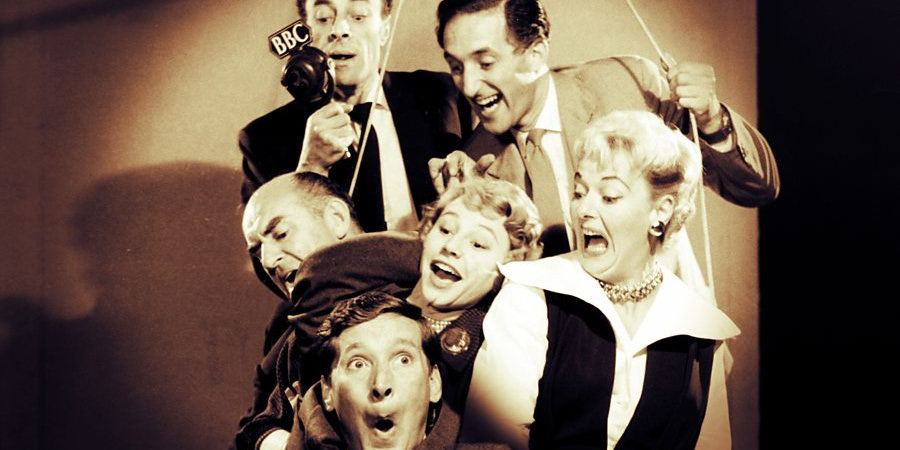
It was her work in revue that earned her a regular role in a new BBC radio series, starting in 1958, called Beyond Our Ken. Written by Eric Merriman and Barry Took, it starred the avuncular Kenneth Horne and featured, besides Marsden, Kenneth Williams, Hugh Paddick and Ron Moody (who was later replaced by Bill Pertwee). Full of fast-paced parodies, comic characters and endless innuendo, it quickly became one of the most popular comedy shows on the radio, and would run for seven very successful series.
As the only woman in the cast, Marsden was required to play every female role that the writers could imagine, from mysterious Mediterranean models to fag-smoking Cockney cleaners to preening socialites to timid little girls to tough Fleet Street columnists. She excelled at them all, somehow finding the right voice and attitude, in spite of having very little time in which to prepare, for every sketch that she was handed.
Barry Took would observe admiringly: 'It would have been easy to be dominated by the strong males in the company but Betty more than held her own. From sexpot to old slag she brought every ounce of performing skill to what she was asked to do.'
Marsden shone in the show, and adored being part of such a talented troupe. 'Everybody was lovely,' she would recall, 'and Kenneth Horne was the king - he was the most enchanting person, wonderful, generous, he used to push us all into the microphone.'
She would regard the years spent on the show as some of the happiest of her career, and the experience would grow even more enjoyable when, in 1965, Beyond Our Ken morphed into Round The Horne, and the team went on for another four series. It was here, especially, that Marsden's skills were appreciated by a large part of the nation.
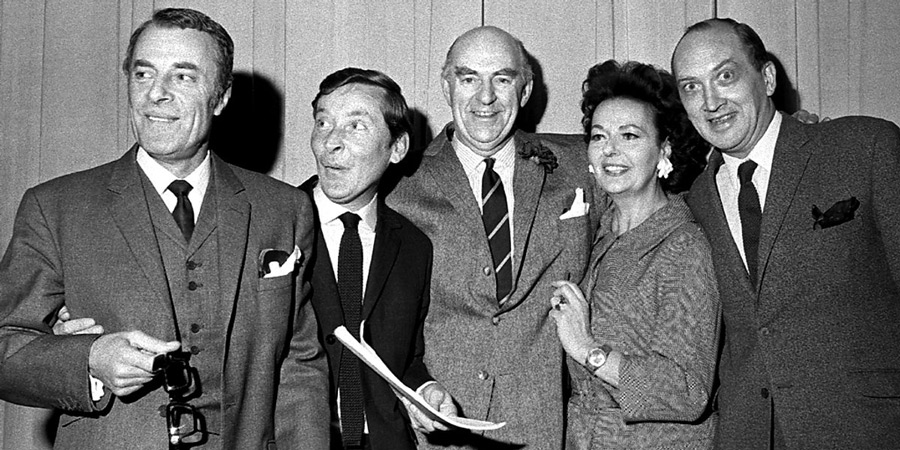
Week after week, as millions listened, she would switch quickly yet seemingly effortlessly from one characterisation to the next, investing a huge amount of energy and art into every single figure she became. Never tentative, she delivered each personality to the microphone fresh and fully-formed.
As the husky-voiced Daphne Whitethigh (modelled on the gothic TV cook Fanny Cradock, and previously known in Beyond Our Ken as Fanny Haddock), she could always be relied on to cue up an innuendo (WHITETHIGH: 'I've been busy writing a book which is to be published this month called 101 Things To Do With A Cucumber.' HORNE: 'Yes, and we won't ask what the odd one is, will we?') as well as mock the dubiously fashionable influencers of the era:
ANNOUNCER: And now the Round The Horne Colour Supplement.
HORNE: First, to answer your queries - Daphne Whitethigh.
WHITETHIGH: Tips for housewives. Want to get rid of that unwanted fatty embarrassment? Here's a simple and painless way: just tell him you want a divorce. Here are some other handy tips. The best way to stop porridge sticking to the saucepan is to eat toast and marmalade for breakfast. A listener in Dorset asks how to avoid those tell-tale crow's feet around the eyes. The answer is to avoid, as far as possible, sleeping in a tree. Next week I shall be describing how to cold cream away those baboon claw marks on your hips. Finally, I've had a lot of enquiries on how to get rid of unpleasant Staines. Well, my suggestion is to start by setting fire to the town hall and blowing up the bridge.
She was very different, but just as popular, as the sex-obsessed Australian émigré Julie Coolibah:
HORNE: Now it's time to meet our young visitor from the Antipodes, Miss Julie Coolibah. Well, how are you getting on - have you found yourself a position yet?
COOLIBAH: What are yer getting at, Bluey?
HORNE: Oh, nothing, nothing!
COOLIBAH: Yeah? Well, just keep yer hands on the desk, that's all. For all I know you might be makin' obscene gestures under there.
HORNE: But I wasn't! Honestly, I wasn't, I assure you!
COOLBAH: Oh, are you some sort of prude or somethin'?
HORNE: No, no! I was asking if you'd turned your hand to anything - no, I'll rephrase that. Er, have you got a job?
COOLBAH: Certainly I've gotta job! I'm one of them temporary women.
HORNE: I don't think I'll say anything.
COOLBAH: Ah, you know, Bluey - shorthand typin' an' that. Oh, it's been a real eye-opener, I can tell you! These office Pommies - they're all sex mad! One fella tried to get me into the Duplicating Room - and we all know what that means!
HORNE: Well, er, they do expect a secretary to have an active role.
COOLBAH: There ya go again - keep away from me! You're all the same, you Poms! Well, you're not gonna catch me that way - I've got it up here!
HORNE: Yes, well, if you've got it up there you should be pretty safe, I should think.
Then she dazzled as the vacuous theatrical romantic Dame Celia Molestrangler, with Hugh Paddick alongside her as the even more vacuous theatrical romantic, the 'ageing juvenile' Binkie Huckaback. Time and again, in their Brief Encounter-style roles, they would gasp and sigh with emotion as they reflected on the infinite ways in which each adored the other, with every one of Celia's sentences sounding like a small avalanche of spirit-soaked sugar lumps:
CELIA: Oh! Oh, Charles! You startled me, creeping up on me like that.
BINKIE: Did I, Fiona?
CELIA: Yes. You gave me a turn.
BINKIE: Did I? Oh. It must be my turn next. I'm just taking a little stroll. Terribly romantic, isn't it, the moonlight glinting on the water? Look, Fiona, up there - it's vast, almost frighteningly vast. And dark. I wonder if there's intelligent life, up there?
CELIA: Up there, Charles?
BINKIE: Not up my nose! Up there, Fiona. The sky. All those stars there, they're shining just for us. See them reflected in the water? There the Plough...There Orion's Belt...and just below it...Orion's Trousers. There what seems to be the Bear...and there what looks like a dead moggy.
CELIA: Oh, it is, Charles. Oh, I feel they're all there. Just for us. With the exception of the dead moggy, of course.
BINKIE: Love is so many things, Fiona. It's wanting and needing and feeling and searching and losing and finding, hoping and dreading, and wanting to need and needing to want and-
CELIA: Don't speak, Charles, not for a moment.
BINKIE: Why?
CELIA: I want to get a word in. Oh, I love you, Charles. Breathlessly, hopelessly, tenderly, despairingly, longingly, meltingly. It's a wordless love, Charles.
BINKIE: We're both lorst, Fiona. Lorst in each other's arms. Fumbling in the dark. Fumbling for the right words. Oh, Fiona - kiss me!
CELIA: Oh, not here, Charles! People will see!
BINKIE: I don't care about people!
MAN: Oi, come in Number Thirteen, your time's up - the park's closing in five minutes!
BINKIE: Come along, Fiona - you paddle, I'll steer!
Among Marsden's many other incarnations was the incredibly beautiful young socialite Wisteria Horseposture ('Oh, Daaaaady!'); fashion expert Celia Twick ('Bosoms are back!'); the much-married and much-divorced aristocrat Lady Beatrice Counterblast, née Clissold ('We found him lying there, with an asp clasped in his grasp!'); the ancient actress Gladys Runt (INTERVIEWER: 'Well, Gladys, at ninety-eight, how do you find it?' GLADYS: 'At my age, I don't bother to look.'); the over-dressed chronic novelist Barbara Cartload ('Actually, dear, I've written one book two hundred times'); the glamorous foreign fil-um star Miss Zsa Zsa Poltergeist ('Daaaaarlink!'); and the rather rough Buttercup Gruntfuttock ('Hello, cheekyface!)'.
When asked how she managed to create so many different-sounding and acting characters, Marsden explained:
I read very carefully. For a long time. It's something that starts in one's stomach, somehow. Right the way down there. You begin to know, or you think you know, how this person will behave, how they'll hold their head, what motivates them. Maybe just one word in the script holds the key to the character. And I find I'm always looking for that one word. It helps me enormously.
When Round The Horne finally ended in 1968, Marsden would remain in demand for radio work because of her remarkable versatility (with shows such as an adaptation of The Darling Buds Of May called Just Perfick starting in 1969), but she would never find another showcase as rewarding as those series that she did with the old team.
There were, by this stage, many other demands on her time in multiple other media. Her movie career, for example, had started as far back as the early 1940s (with her first significant role being in the wartime movie Ships With Wings), but had grown much busier by the Sixties, with her appearing in a numerous dramas as well as comedies, including a taut business-centred film noir named The Big Day (1960); a gay-themed melodrama called The Leather Boys (1964); a frothy Terry-Thomas vehicle entitled The Wild Affair (1965); Denis Norden's Victorian sex comedy The Best House In London (1969); and the thriller Eyewitness (1970).
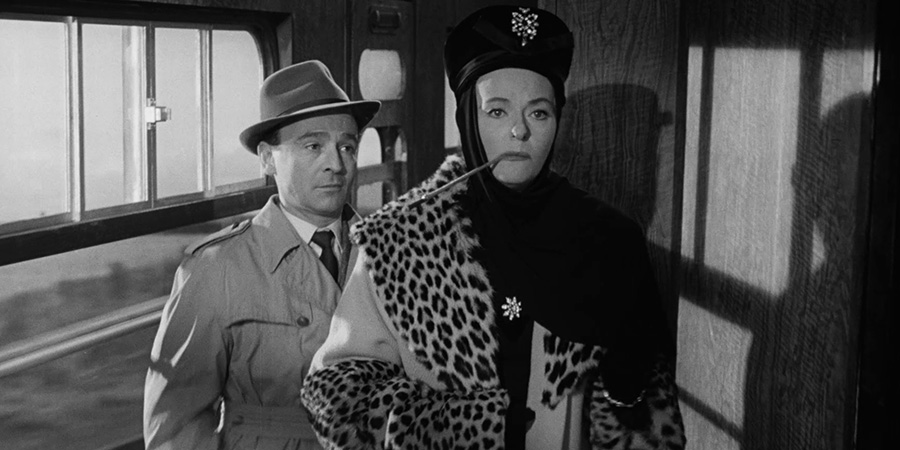
Two of her most notable big screen performances came in Carry On films. In Carry On Regardless (1961), she had a brief but memorable role as a glamorous Mata Hari vision on a train, pestered by the small and excitable odd-job man Sam (Kenneth Connor) who has convinced himself that he is on a spying mission. She only had a few lines, which she breathed out in a suitably smoky tone, but she made the most of a scene that culminated in her slapping Sam sharply and then storming off down the corridor.
She was given much more to do in Carry On Camping (1969), playing a domineering wife in short trousers whose chalk-on-a-blackboard of a cackle was as memorably terrifying, in its own way, as the stabbing strings in Psycho. It was an extraordinary laugh - a deep, throaty, untameable thing that kept rising up to an ear-splitting squeak before descending once again, sounding a bit like a cat chasing a rat inside a dustbin.
It was attached to the character of Harriet Potter, a seriously twitch-inducing 'jolly hockey sticks' type whose love of the outdoors has him indoors, Peter (Terry Scott), dragged along behind her like a broken cowboy roped to the back of a horse (HARRIET: 'Oh, isn't this WONDERFUL? So much better than dirty, stuffy old London!' PETER: 'Funny thing about "dirty, stuffy old London" - I can walk for miles and miles without ever getting bitten, stung or stepping into something. That's more than I can say with the country!' HARRIET: 'Ha-ha-hahaha-ha-ha-eeek-eeek-eeek!').
They make for a darkly comic double act. At one point, Peter, trying to ignore her constant squawking as he bangs in the pegs of the tent, pauses for a moment, standing behind her directly above her head, hammer in hand, and almost gives in to temptation, before reluctantly dropping the would-be weapon to the ground and going off to get some milk.
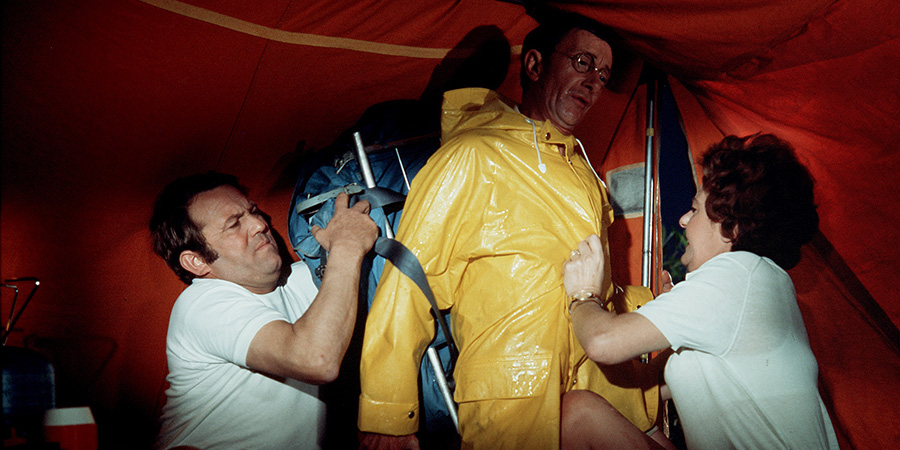
It was an especially enduring performance by Marsden - like a monster Bette Davis might have played, only at twice the speed and at a higher volume. At one point her old pianist, Charles Hawtrey, tucked up close to her in a tent, gives her a nervous look that suggests he wonders what on earth he unleashed into the world all those years before.
She would go on to make several other artfully realised characterisations in later years, including in The Dresser (1983) - as Violet Manning - and Little Dorrit (1987) - as Mrs Barnacle. There would be no suitably rich and vivid starring role for her that her talent always deserved, but she still managed to steal the odd scene with a look or a sound or a gesture that conveyed more than the script had suggested (such as the moment in The Dresser when Violet, her expression switching from parochial concern to worldly scepticism, scoffs at the news that the great actor is a little tired: 'Aren't we all, dear, aren't we all!').
Her television work was even more varied during a period spanning just over half a century. She was in episodes of period dramas such as The Pickwick Papers (1952); revues including Before The Fringe (1967); comedies such as The World Of Beachcomber (1968); thrillers such as Callan (1969); the sci-fi series Blake's 7 (1981); the sitcom The Cabbage Patch (1983); the biographical mini-series Anastasia: The Mystery Of Anna (1986); the sketch series French And Saunders (1987); the police drama The Bill (1989) and The Memoirs Of Sherlock Holmes (1994). It often took a moment or more to recognise her, given her ability to change her look and alter her voice, but then the craft would become apparent as she suited each mood and situation with such flair and subtle precision.
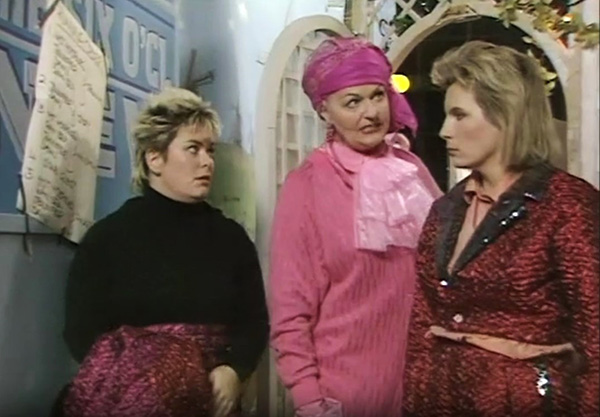
The only sign of any strain came off stage, when the multiple demands on her time and energies sometimes took their toll. Colleagues sometimes spoke of her 'highly-strung brilliance,' and it was true that, when she was working at her hardest, the demands of her schedule could sometimes cause problems for both her mental and physical health. Finding a diet that helped rather than hindered her attempts to control her anxiety thus became something over which she always fussed:
Eating was the most important thing. Eat: eat breakfast, eat lunch. Eat. And that would sort of feed your energy. But it's not a very easy thing to do because I'm a very nervous actress. And for the first night coming up, the idea of eating used to make me want to vomit, so I used to drink a pint of milk. I'd have that in my dressing room and drink that before going on, because I couldn't eat - nervous indigestion, too dreadful for words.
The best way that she found to calm herself back down was simply to withdraw for a while from all the noise and spend time at home with her family. Her husband was Jimmy Wilson Muggoch, an army doctor from Edinburgh (and part-time comedy writer and lyricist under the pseudonym of 'Jimmy Wilson'), to whom she had been married for more than three decades (having met on a troop ship during the war, when she was on duty with ENSA, their wedding took place in a bamboo hut at Ibadan in Nigeria, with her bouquet made up of flowers picked from nearby jungle trees), and they had two children, James and Lindsay. They lived together on a rather grand-looking 80ft-long houseboat, called 'Chilham' - a converted coal barge they had bought in the early Sixties - moored at Kew Bridge. It was here that she loved to relax and entertain friends with plenty of food, wine and music.
A sign of how magnetic a personality she was, especially in those pressure-free periods of leisure, is to be found in the reminiscences of her friends, many of whom, like Binkie and Celia, could not come close to capturing her distinctive appeal without adding one adjective after another. The actor and writer Gerald Moon, for example, would recall her 'friendship, positiveness, no-nonsense thinking, stamina, vitality, zest for life, style, taste and the years of laughter'. She was, other admirers would say, an endlessly fascinating, as well as funny, force of nature.
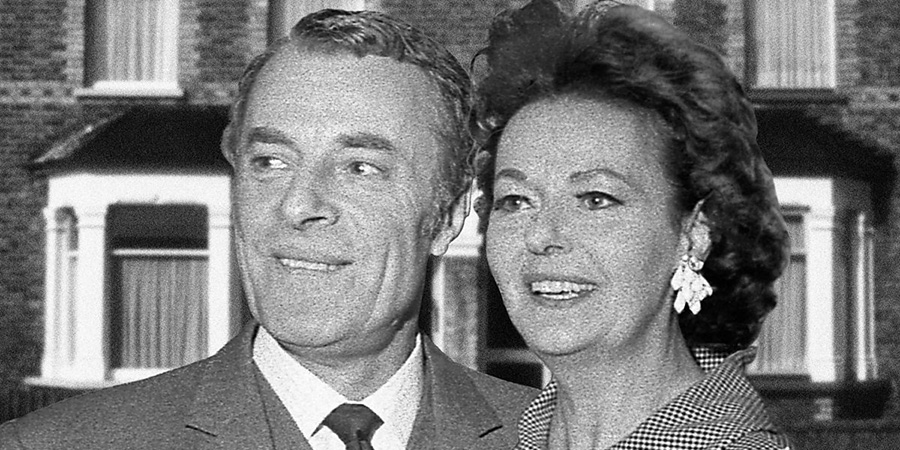
A great blow came when her husband passed away in 1975, but Betty fought on, finding some comfort in the camaraderie of her profession, and continued to act right up until a short time before her death. She moved to the actors' home, Denville Hall, in the spring of 1998, where she would delight her fellow residents with many funny voices, comic stories and plenty of wickedly entertaining anecdotes.
She died a few months later, aged seventy-nine, on a warm evening in July, while sitting at the bar, elegantly dressed with a cigarette in one hand and a gin and tonic in the other ('She didn't spill a drop,' said her daughter). It was, her friends reflected, as if she had scripted her own departure.
When, late on in her career, she was asked to explain her gift for making people laugh, she preferred not to pry - or at least not have others pry - too deeply into the process:
To describe comedy is something I'm not capable of doing. And why? Because I cannot and will not analyse it. I've never been able to understand why people laugh at me. And I'm so grateful they do, but I've never understood why. And quite honestly I wouldn't like to attempt to discover the reason within myself, because if I did, maybe if I really knew why I made them laugh, I wouldn't make them laugh any more.
If Betty Marsden did not care to examine the causes of her comedy, she was always happy to embrace its effects. 'To share in so much enjoyment,' she said, 'it's all been such fun.' She would certainly have been delighted to have thought that, in all the years that have followed, far from being 'lorst and gawn', she continues to be remembered and cherished, 'constantly, endlessly, ceaselessly', for the many characters, and voices, that she left behind.
Help us publish more great content by becoming a BCG Supporter. You'll be backing our mission to champion, celebrate and promote British comedy in all its forms: past, present and future.
We understand times are tough, but if you believe in the power of laughter we'd be honoured to have you join us. Advertising doesn't cover our costs, so every single donation matters and is put to good use. Thank you.
Love comedy? Find out moreBeyond Our Ken - The Collected Series 1-4

All 60 surviving episodes from the first four series of the fabulous forerunner to Round The Horne - plus bonus programme Forty Laughing Years.
An irresistible mix of sketches, songs, puns and double entendres, Beyond Our Ken kept the nation laughing over seven series and 123 episodes between 1958 and 1964.
With its witty wordplay, zany humour and comic catchphrases, it remains every bit as hilarious and entertaining today. Featuring larger-than-life characters like Rodney and Charles, roving reporter Cecil Snaith and doddery duo Ambrose and Felicity - not to mention avuncular host Kenneth Horne himself - this 'sort of radio show' is full of classic comedy moments.
All your favourites are here in these 60 episodes, including spoof documentary series Hornerama, with its regular investigations into 'topics of immediate interest' such as showbusiness, shipping, photography, food, the City - and many more. There's also a wealth of surprising, surreal incidents from Kenneth Horne's week, the latest film releases in 'Picture Go Round', and a unique take on Any Questions, with panellists Hankie Flowered, Ricky Livid, Fanny Haddock and Arthur Fallowfield. Musical interludes are provided by a host of top artistes, among them Pat Lancaster, Janet Waters, The Malcolm Mitchell Trio, The Fraser Hayes Four and the BBC Variety Orchestra.
Scripted by Eric Merriman and Barry Took, these much-loved shows star Kenneth Horne, Kenneth Williams, Hugh Paddick, Betty Marsden and Bill Pertwee.
First released: Thursday 6th May 2021
- Distributor: BBC Digital Audio
- Minutes: 1,879
BCG may earn commission on sales generated through the links above.
Beyond Our Ken - The Collected Series 5-7

The complete Series 5-7 of the legendary BBC radio comedy.
One of the funniest and most popular series on radio between 1958 and 1964, Beyond Our Ken delighted audiences nationwide throughout its seven series and 123 episodes. Packed with sketches, songs, catchphrases and innuendo, it mixes silliness, satire and sophistication to superb effect, and continues to make us laugh today.
Kenneth Horne - 'who prefers to remain anonymous' - is our unflappable host in these 46 episodes, presiding over an array of fabulous characters such as camp duo Charles and Rodney, celebrity chef Fanny Haddock and countryman Arthur Fallowfield (for whom the answer always lies in the soil, regardless of the question).
Regular documentary spoof 'Hornerama' returns, with a look at topics including the arts, the countryside, travel and television; and Kenneth Horne's weeks become increasingly extraordinary and eventful. Plus, the team tackle the Siege of Troy, present a new interpretation of 'Horne In Wonderland' (or 'Beyond Our Looking Glass'), offer their take on Caesar and Cleopatra's story and revel in a Regency romp through Beau Brummel's Brighton. Accompanying them for some musical interludes are Jill Day, Edwin Braden, the Fraser Hayes Four, Eileen Gourlay and the BBC Variety Orchestra.
Written by Eric Merriman, these wonderful, whimsical shows star Kenneth Horne, Kenneth Williams, Hugh Paddick, Betty Marsden and Bill Pertwee.
First released: Thursday 6th May 2021
- Distributor: BBC Digital Audio
- Minutes: 1,416
BCG may earn commission on sales generated through the links above.
Round The Horne - The Complete Series One

Kenneth Horne, Kenneth Williams, Betty Marsden and Hugh Paddick star in 16 episodes of the anarchic 1960s radio comedy.
Round The Horne arrived on BBC radio in 1965, bringing laughter to Sunday lunchtimes throughout the land. Over the course of sixteen weekly episodes it carved a niche in the history of broadcast comedy, a sketch show which prodded the boundaries of propriety and innuendo. At its heart was the suave and upstanding Kenneth Horne, around which revolved the multiple naughty personas of Kenneth Williams, Betty Marsden, Hugh Paddick and Bill Pertwee.
Among the parade of regular characters were Julian and Sandy, the camp couple of resting thespians happy to turn their hands to anything, Rambling Syd Rumbo the musical cordwangler, Fiona and Charles the passionate duo, and J. Peasemold Gruntfuttock the world's dirtiest man. Meanwhile regular film parodies, spoof sagas and musical interludes peppered the mix.
Round The Horne earned its place in the annals of comedy history, and is fondly remembered today as a groundbreaking series that influenced many more to come. Here the entire first series can be enjoyed once again, along with a PDF booklet featuring cast biographies and a full series history.
First released: Wednesday 15th October 2014
- Distributor: BBC
- Catalogue: 9781471366642
![]() Buy and sell old and new items
Buy and sell old and new items
Search for this product on eBay
BCG may earn commission on sales generated through the links above.
Round The Horne - The Complete Series Two

Kenneth Horne, Kenneth Williams, Betty Marsden and Hugh Paddick star in 15 episodes of the anarchic 1960s radio comedy.
Round The Horne arrived on BBC radio in 1965, bringing laughter to Sunday lunchtimes throughout the land. Over the course of sixteen weekly episodes it carved a niche in the history of broadcast comedy, a sketch show which prodded the boundaries of propriety and innuendo. At its heart was the suave and upstanding Kenneth Horne, around which revolved the multiple naughty personas of Kenneth Williams, Betty Marsden, Hugh Paddick and Bill Pertwee.
Among the parade of regular characters were Julian and Sandy, the camp couple of resting thespians happy to turn their hands to anything, Rambling Syd Rumbo the musical cordwangler, Fiona and Charles the passionate duo, and J. Peasemold Gruntfuttock the world's dirtiest man. Meanwhile regular film parodies, spoof sagas and musical interludes peppered the mix.
Round The Horne earned its place in the annals of comedy history, and is fondly remembered today as a groundbreaking series that influenced many more to come. Here the entire second series can be enjoyed once again, plus the 1966 Christmas episode, The Hunchback Of Notre Dame and a special Transcription Services episode The Man With The Golden Thunderball, along with a PDF booklet featuring cast biographies and a full series history.
First released: Wednesday 15th July 2015
- Distributor: BBC
- Catalogue: 9781785291098
![]() Buy and sell old and new items
Buy and sell old and new items
Search for this product on eBay
BCG may earn commission on sales generated through the links above.
Round The Horne - The Complete Series Three

Kenneth Horne, Kenneth Williams, Betty Marsden and Hugh Paddick star in 20 episodes of the anarchic 1960s radio comedy.
Round The Horne arrived on BBC radio in 1965, bringing laughter to Sunday lunchtimes throughout the land. It carved a niche in the history of broadcast comedy, a sketch show which prodded the boundaries of propriety and innuendo. At its heart was the suave and upstanding Kenneth Horne, around which revolved the multiple naughty personas of Kenneth Williams, Betty Marsden, Hugh Paddick and Bill Pertwee.
Among the parade of regular characters were Julian and Sandy, the camp couple of resting thespians happy to turn their hands to anything, Rambling Syd Rumbo the musical cordwangler, Fiona and Charles the passionate duo, and J. Peasemold Gruntfuttock the world's dirtiest man. Meanwhile regular film parodies, spoof sagas and musical interludes peppered the mix.
Round The Horne earned its place in the annals of comedy history, and is fondly remembered today as a groundbreaking series that influenced many more to come. Here the entire third series can be enjoyed once again, along with a PDF booklet featuring cast biographies and a full series history.
First released: Thursday 3rd December 2015
- Distributor: BBC
- Catalogue: 9781785292101
![]() Buy and sell old and new items
Buy and sell old and new items
Search for this product on eBay
BCG may earn commission on sales generated through the links above.
Carry On - Collection 2
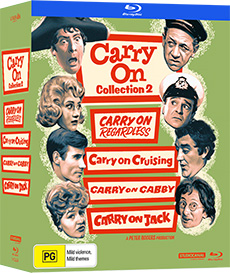
Presenting the worldwide debuts on Blu-ray for these classic comedies.
Carry On Regardless (1961)
The head of a temp agency (Sid James) finds that all the people on his books are incapable of performing the odd jobs they are hired for. Eager employees include Kenneth Williams, Charles Hawtrey, Kenneth Connor and Joan Sims.
Carry On Cruising (1962)
A life on the ocean wave with the Carry On crew! Sid James is the long-suffering Captain of the luxury cruise liner S.S. Happy Wanderer, a ship full of misfits who don't know their portholes from any other holes! It isn't long before the luckless passengers mix with the hopeless crew to raise titanic laughs on the ship of fools.
Carry On Cabby (1963)
Speedee Taxis is a great success, which means its workaholic owner Charlie starts neglecting Peggy, his wife. Suddenly a fleet of rival taxis appears from nowhere and start pinching all the fares. The rivals are Glamcabs, and they have a secret weapon. All their drivers are very attractive women! Who's behind Glamcabs? It's open warfare and only one fleet can survive!
Carry On Jack (1964)
The Carry On gang strikes again - this time in the bold, brave days of the Armada, a time when countries were judged by their strength at sea, and men by their naval heroism!
First released: Wednesday 19th July 2023
- Distributor: Via Vision
- Discs: 4
- Minutes: 361
- Catalogue: VVE3332
![]() Buy and sell old and new items
Buy and sell old and new items
Search for this product on eBay
BCG may earn commission on sales generated through the links above.

